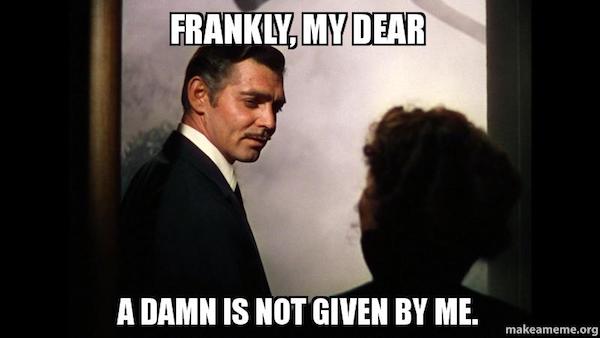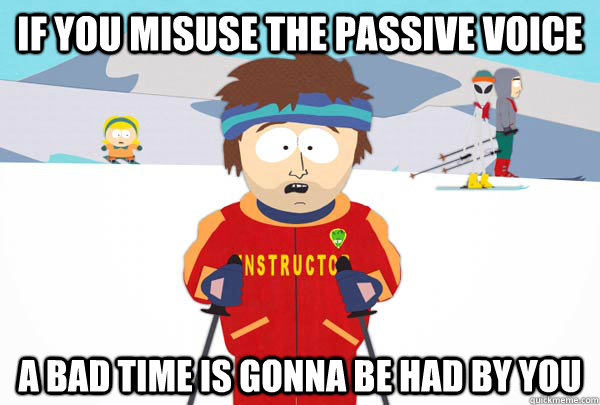Anyone who either is or has worked with an editor has had to deal with the common writing issue of active voice vs. passive voice. Any and every editor worth their salt will tell you to favor active voice, while writing in passive voice is just another bad habit you’ll have to learn to break. But why? What is active voice and what makes it so much better than its passive counterpart?

Finally, a fun way to check for passive voice!
(Image source: Grammarly Blog)
In a nutshell, an active voice sentence is when the subject does an action to the object, while passive voice is when the subject has an action done to it by the object. Both voices can be used to convey the same message, yet writing tips often advise favoring the former over the latter. This is especially true for fiction, which relies heavily on not only keeping readers engaged for an entire story, but evoking their emotions as you guide them through the world of your narrative.
So to help you create stronger and more appealing fiction, here are three reasons you should favor active over passive voice. Good luck!
1) Active voice is clearer, stronger, and more concise.

The longer you’ve been writing, the more you appreciate concise and direct language. In this modern-day barrage of knowledge, information that’s delivered and processed quickly tends to have a greater impact, so the fewer words you can use to convey a message, the better. One way to achieve this is by replacing passive voice statements with their active counterparts. Observe the difference:
Active: She loved him, but he rejected her.
Passive: He was loved by her, but she was rejected by him.
Notice how the active voice sentence is simpler yet much more powerful. Written concisely, the feelings of love and rejection between these characters become prominent and impactful, whereas the longer sentence appears convoluted and awkward, despite having the same meaning. By using fewer words, you can keep your writing direct and make your narrative stronger, which will result in more effective prose. Why let it be done by you when you can just do it?
2) Active voice sounds more natural.
Think about your favorite story, that book you enjoy so much you could read it over and over. Now think about why you love it. If “it speaks to me” is one of the first reasons to come to mind, then you’ve just made an excellent point to support active voice.

The types of writing that most resonate with us are the ones that sound familiar, that is, that mimic the way we speak. Active voice achieves this far more easily than passive voice because most of our speech is active. For example, when bragging to someone about an achievement, you wouldn’t tell them, “That was done by me”; you would say, “I did that!” Similarly, narrative should be as direct and “active” as spoken words. You want to draw your readers in and keep them hooked to the last word, and what better way to achieve that than by speaking directly to them?
3) Active voice keeps the momentum going.
One of the keys to good storytelling is to always keep the action moving forward. Even slower descriptive scenes should read smoothly, with new and relevant information in every line. Passive voice makes this difficult, as it has a way of dragging the pace of a story with unnecessary words and phrases. Don’t give your readers a motive to put your book down!

You don’t want your readers to have a bad time, do you?
Keep your prose clean by limiting passive voice to the few instances in which it works best:
- when you can’t say who performed the action;
- when you want to emphasize the action itself; and
- when you’re highlighting a general truth.
In all other cases, active voice will better maintain the momentum in your narrative, keeping your readers engaged through each new action until the end of the story. A good example of why this works is the Hero’s Journey: the hero answers the call to adventure, faces trials, confronts a great ordeal, collects the reward, and returns from his or her quest a new person. At every stage, the hero does something that leads to something else, standard cause and effect that propels the action forward. Apply this technique to your prose and the active voice will accomplish its most important goal: to make your writing active and interesting!
Perhaps you tend to overuse the passive voice without realizing (I know I’m still guilty of this), but luckily it’s an easy problem to fix. So the next time you edit one of your stories, keep an eye out for unnecessary passive sentences and replace them with their active parallels. Your readers will appreciate the effort!
What are your thoughts on active and passive voice? Are you guilty of not using active voice as frequently as you should?


This post was pleasing after it was read by me. 😀
Haha, it was just as fun to be written by me! Thanks for reading! 🙂
Guilty! I’m horribly guilty of passive voice! *hangs head in shame* =)
Haha, so am I! It’s a tough habit to break; even after reading so much about active voice, I still end up picking a ton of passive voice out of my drafts during editing! Thanks for reading! 🙂